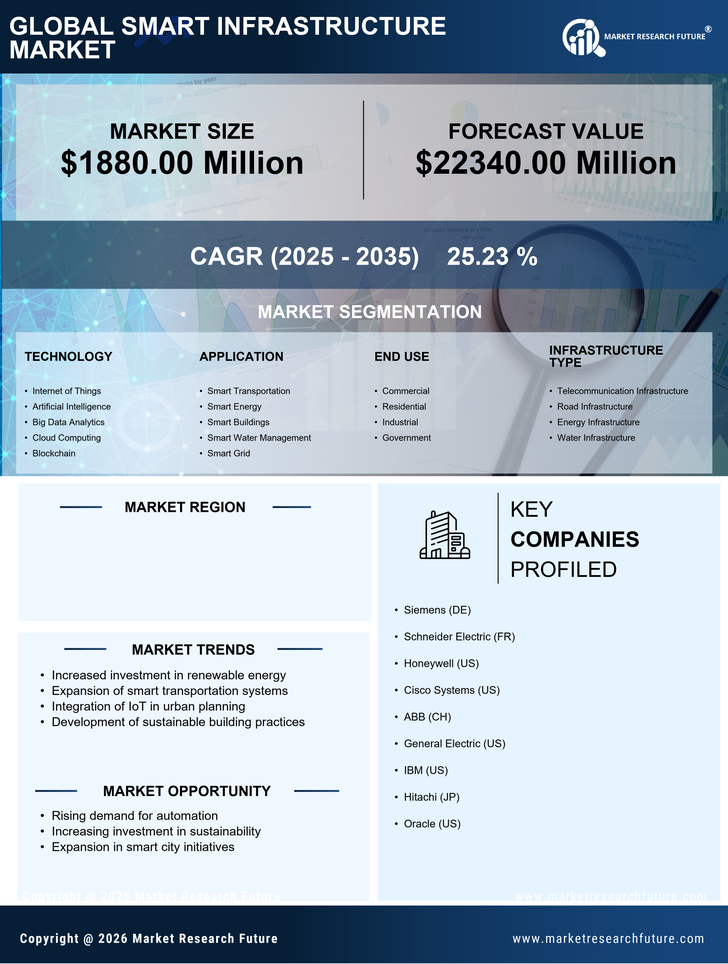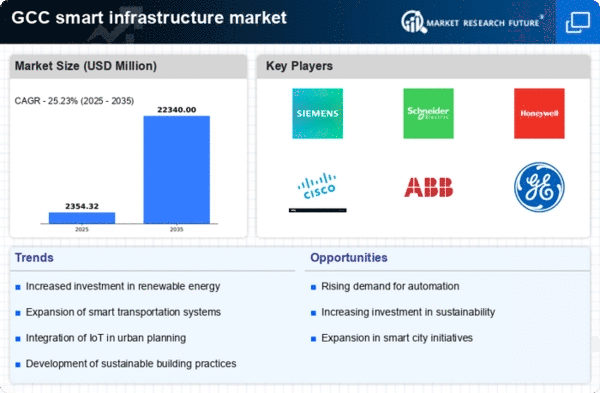Increased Focus on Energy Efficiency
Energy efficiency is becoming a critical driver in the smart infrastructure market, particularly in the GCC, where energy consumption is high. Governments and organizations are prioritizing sustainable practices to reduce carbon footprints and enhance energy management. The implementation of smart meters and energy management systems is gaining traction, allowing for real-time monitoring and optimization of energy use. This focus on energy efficiency is projected to reduce energy consumption by up to 20% in the next decade. As a result, the smart infrastructure market is likely to expand, driven by the demand for solutions that promote sustainability and reduce operational costs.
Government Initiatives and Investments
The smart infrastructure market in the GCC is experiencing a surge due to proactive government initiatives aimed at enhancing urban development. Governments are allocating substantial budgets, with investments projected to reach $100 billion by 2030. These initiatives focus on integrating advanced technologies into public services, transportation, and utilities, thereby improving efficiency and sustainability. The emphasis on smart cities aligns with national visions, such as Saudi Arabia's Vision 2030 and the UAE's Vision 2021, which aim to foster innovation and economic diversification. As a result, the smart infrastructure market is likely to witness accelerated growth, driven by these strategic investments and policies.
Rising Urbanization and Population Growth
Urbanization in the GCC is rapidly transforming the landscape, with the urban population expected to reach 90% by 2030. This demographic shift is driving demand for smart infrastructure solutions that can accommodate the needs of growing cities. The smart infrastructure market is responding to challenges such as traffic congestion, waste management, and energy consumption. For instance, smart transportation systems are being developed to enhance mobility and reduce travel times. The market is projected to grow at a CAGR of 15% over the next five years, indicating a robust response to urbanization challenges. This trend underscores the necessity for innovative infrastructure solutions in the GCC.
Technological Advancements in Infrastructure
The smart infrastructure market is significantly influenced by rapid technological advancements, particularly in areas such as artificial intelligence, big data, and IoT. These technologies are being integrated into infrastructure projects to enhance operational efficiency and service delivery. For example, smart grids are being deployed to optimize energy distribution, while smart water management systems are improving resource efficiency. The GCC region is witnessing a shift towards digitalization, with investments in smart technologies expected to exceed $50 billion by 2025. This technological evolution is likely to reshape the smart infrastructure market, fostering innovation and improving the quality of life for residents.
Growing Demand for Enhanced Security Solutions
Security concerns are increasingly shaping the smart infrastructure market in the GCC. With the rise in urbanization and technological integration, there is a heightened need for advanced security solutions to protect critical infrastructure. Smart surveillance systems, access control, and cybersecurity measures are being implemented to safeguard public spaces and data. The market for security technologies is expected to grow by 12% annually, reflecting the urgent need for enhanced safety measures. This growing demand for security solutions is likely to drive innovation within the smart infrastructure market, ensuring that infrastructure projects are resilient and secure.

















